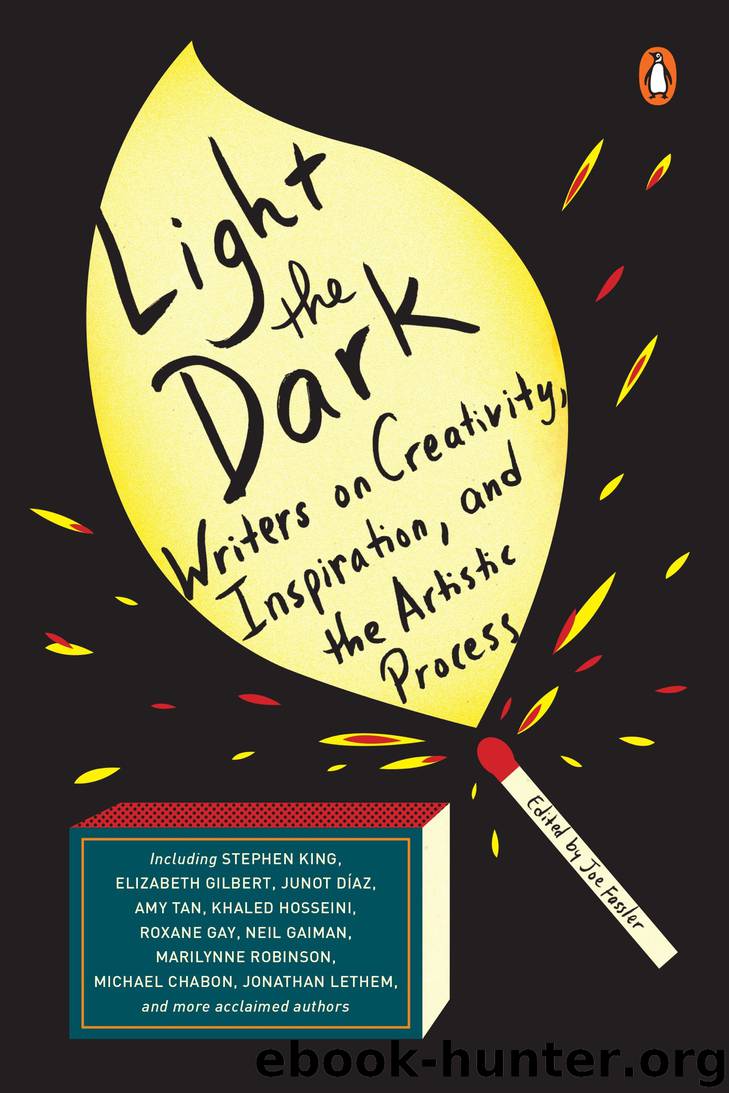Light the Dark by Joe Fassler

Author:Joe Fassler
Language: eng
Format: epub
Publisher: Penguin Publishing Group
Published: 2017-09-26T04:00:00+00:00
Leopards break into the temple and drink to the dregs what is in the sacrificial pitchers; this is repeated over and over again; finally it can be calculated in advance, and it becomes a part of the ceremony.
It would have been one of the last things of his I read, just because of my nature as a reader. I dig narrative. I wouldn’t have been shopping for aphorisms, which have nothing to do with what brought me to literature in the first place. I was a very literal reader. I wanted stories with characters, lots of occurrences and situations. That’s what I was reading for, and how Kafka first netted me: with this extreme, perverse, but very compulsive narrative. Borges writes about Kafka in a way that turns the Greek philosopher Zeno into his precursor, because Kafka’s narrative is all based on Zeno’s paradox: the idea that you’re always closing half the distance to your target, but you never fully arrive. It’s a consummately frustrated form of narrative progress, but it is one, and it has a labyrinthine, compulsive, hypnotic quality to it. That narrative quality is what gets me in a position to become a reader of Kafka’s language and someone who identifies with his philosophical implications (though it’s hard to say just what those are). It begins with story.
In its way, the leopards in the temple is a tiny little story. There’s a violent and exciting plot that takes place over a certain amount of time. But one of the things that’s entrancing is—well, how long does it take to incorporate the leopards into the ceremony? Did it take hundreds of years of civilization to incorporate the leopards our forefathers once bemoaned? Or is it—well, last Wednesday we thought it was a problem but this week we decided to work around it? However long the span of time is, there’s a sort of intensely embedded kind of narrative situation with characters who make a decision to resolve a kind of conflict in favor of incorporating chaos into their worldview.
But it also looks to me like an M. C. Escher drawing, which is another thing I thought was extremely cool when I was fifteen years old. In some oblique way, this topological quality is still what I respond to in Kafka. The leopards are a piece of the outside that ultimately fit on the inside. Somehow, they complete a shape that initially seems like it’s meant to be a negative space, but actually the negative space becomes essential to the completion of the positive space. The temples and the chalices are like the drawing that Escher would render in lighter colors with cutout shapes of negative space that you begin to see look like a leopard, and then you realize—wait a minute, the leopard is the drawing. There’s a yin-yang quality to it, the way these two things become interdependent spatially.
To me, the leopards in the chapel are a beautiful allegory of high and low culture. I wear on
Download
This site does not store any files on its server. We only index and link to content provided by other sites. Please contact the content providers to delete copyright contents if any and email us, we'll remove relevant links or contents immediately.
Big Magic: Creative Living Beyond Fear by Elizabeth Gilbert(5771)
Paper Towns by Green John(5191)
On Writing A Memoir of the Craft by Stephen King(4944)
The Doodle Revolution by Sunni Brown(4761)
Hyperfocus by Chris Bailey(4118)
Evolve Your Brain by Joe Dispenza(3678)
Unlabel: Selling You Without Selling Out by Marc Ecko(3663)
The Red Files by Lee Winter(3416)
Draw Your Day by Samantha Dion Baker(3364)
The Power of Mindful Learning by Ellen J. Langer(3222)
The Art of Dramatic Writing: Its Basis in the Creative Interpretation of Human Motives by Egri Lajos(3067)
The War Of Art by Steven Pressfield(2961)
Applied Empathy by Michael Ventura(2904)
The 46 Rules of Genius: An Innovator's Guide to Creativity (Voices That Matter) by Marty Neumeier(2855)
How to be More Interesting by Edward De Bono(2791)
Keep Going by Austin Kleon(2763)
Why I Am Not a Feminist by Jessa Crispin(2760)
How to Stop Worrying and Start Living by Dale Carnegie(2722)
You Are Not So Smart by David McRaney(2653)
